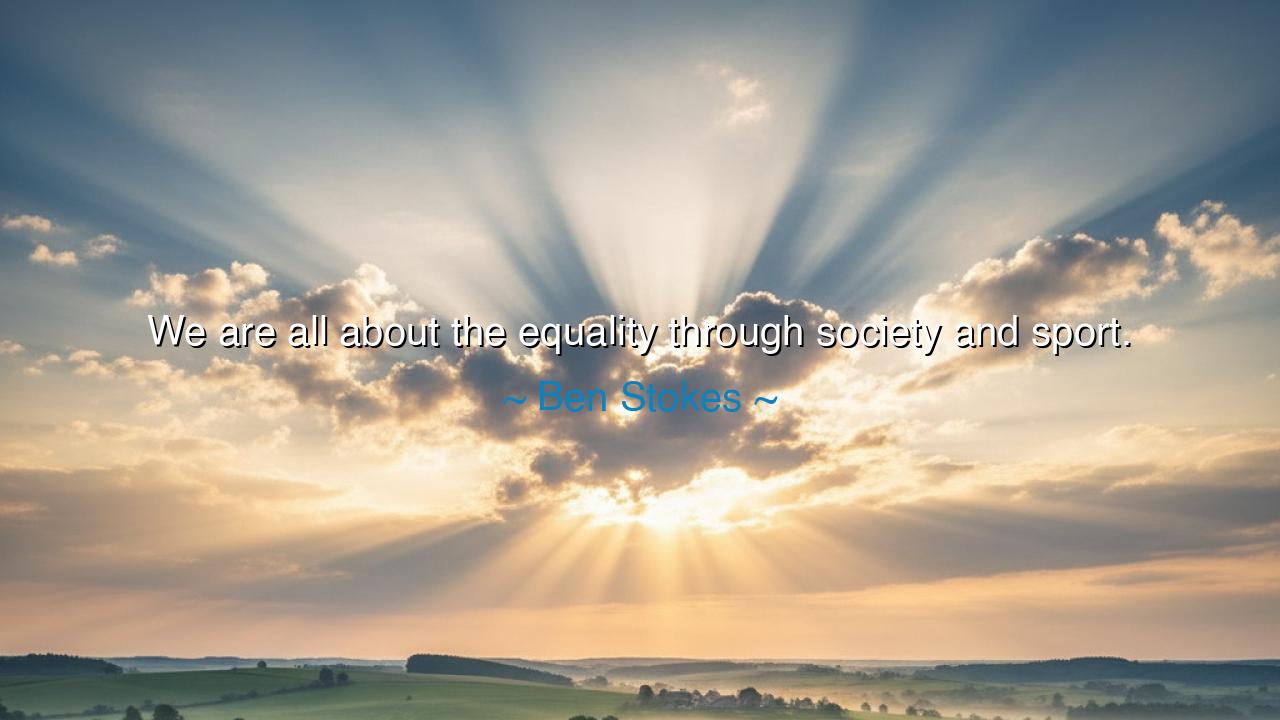
We are all about the equality through society and sport.






In the resolute and inspiring words of Ben Stokes, captain, athlete, and leader of men, we find a truth that stretches far beyond the boundaries of the cricket field: “We are all about the equality through society and sport.” Though spoken in the context of the game, these words are not confined to competition—they are a declaration of unity, of justice, and of the human spirit’s longing to stand as one. For in sport, as in life, the rules are meant to be the same for all, the field level, the contest fair, and the reward earned through effort alone. What Stokes reminds us of is that sport is not merely a game—it is a mirror of the world we seek to build, a place where equality is not an ideal, but a living practice.
The origin of this quote lies in Stokes’s own journey, forged through triumph and trial. Born in New Zealand and raised in England, he became one of cricket’s fiercest warriors, known not only for his strength but for his humility. He has spoken often of teamwork, diversity, and inclusion, recognizing that every victory is not the triumph of one, but of all. When he says, “we are all about the equality through society and sport,” he draws upon his understanding that both are intertwined—that what happens on the field reflects the values of the society that nurtures it. In sport, we find fairness, respect, and opportunity; and in society, we must strive to build the same.
In ancient times, the Olympic Games of Greece were founded upon this very principle. When the torch was lit, wars ceased, and the enemies of nations stood side by side, competing not in hatred but in honor. There, the farmer could race beside the nobleman, the mason beside the prince. For a brief moment, the world glimpsed what equality through sport could mean—a harmony of purpose, a unity born of shared striving. This, too, is what Stokes calls for: that sport should not divide by wealth, color, or class, but uplift all who dare to participate. In this way, the playing field becomes sacred ground—a place where the spirit of humanity rises above all barriers.
And yet, the message reaches deeper still. Stokes speaks not only of sport’s fairness, but of its power to transform society itself. The unity born on the field can spread beyond it—to schools, to streets, to nations. When young people play together, they learn that equality is not theory—it is action. They learn that respect must be given to earn it, that success is not inherited but fought for. Every pass, every partnership, every shared victory teaches the heart what laws and lectures alone cannot: that the strength of one is bound forever to the strength of all. Thus, sport becomes a living sermon—a daily rehearsal for the justice we wish to see in the world.
History offers us luminous examples of this truth. Consider the story of Nelson Mandela, who, after decades of imprisonment, used the game of rugby to unite a divided South Africa. The 1995 Rugby World Cup, once a symbol of apartheid’s divisions, became an instrument of reconciliation. When Mandela donned the jersey of the national team and stood beside white and Black athletes alike, the crowd that once scorned him erupted in love. He understood, as Stokes does, that sport has the power to heal what politics divides. Through a shared field, a shared victory, he taught a nation the meaning of equality—not as a law, but as a living spirit.
Yet, Stokes’s words carry also a warning. Equality cannot be claimed through words alone—it must be practiced, earned, and defended. Just as athletes train in sweat and sacrifice to achieve mastery, so too must society labor to achieve justice. It is not enough to preach fairness; one must live it daily, in how we treat others, in how we lift those who fall, and in how we celebrate not only the winners, but the effort of all who strive. Equality is not a gift bestowed—it is a covenant kept, a discipline of the soul.
So let this teaching, born from the heart of sport and carried into the heart of society, be remembered: the field of equality is wide enough for all who dare to play upon it. Whether you are a leader or a learner, an athlete or an observer, let your every action honor the fairness you wish to see. Lift your teammate. Respect your rival. Play hard, but play fair. And above all, remember that victory means little if it is not shared in the spirit of equality and grace.
For in the words of Ben Stokes, we hear not only the cry of an athlete, but the wisdom of a human being who understands that sport and society are one body, and that the health of one determines the health of the other. May we all, then, live as players in the great game of life—not competing to divide, but striving together to lift all toward the higher ground of justice, unity, and equality.






AAdministratorAdministrator
Welcome, honored guests. Please leave a comment, we will respond soon